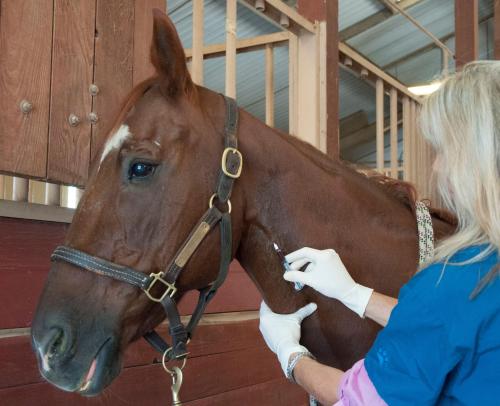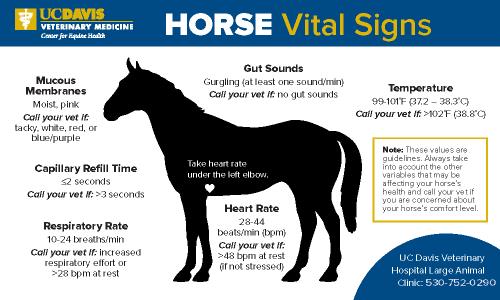Colic Happens:
What You Can Do Before, During, and After a Colic
Most equestrians will encounter a colicking horse at some point. Whether the episode is mild or severe, being able to recognize the signs of colic and react quickly and appropriately may be vital. There are things that you can do before, during, and after a horse colics to maximize the chances for a successful outcome.
What to Do Before a Horse Colics
Since colic is not a matter of if, but when, it is best to be prepared. Here are some important things you can do before a horse colics:
- Know how to assess vital signs. Monitor your horse’s temperature, heart and respiratory rates, gut sounds, capillary refill times, and mucous membranes on a regular basis so you know what is normal and can recognize when values change, which can indicate a problem. (See Horse Vital Signs figure below.)
- Keep emergency numbers handy. Post your veterinarian’s contact information in the barn and other common areas for easy reference and have a backup plan if they are unavailable. If your horse is insured, have the contact information for the insurance company and policy number readily available.
- Plan for emergency transportation. Make sure that you have access to a truck and trailer, that your horse can be loaded easily and that you have accurate directions to a referral hospital.
- Know your limits. Understand your insurance policy and consider financial limitations or practical concerns so you can make informed decisions about treatment and subsequent care.
What do Do When a Horse Colics
How to Recognize Colic and When to C-A-L-L V-E-T
Clinical Signs - pawing, flank watching, kicking at belly, rolling
Agitated - sweating, restless, up and down
Lack of manure
Loose or dry manure
Vital signs - increased heart rate, reduced/absent gut sounds, changes in gum color, breathing fast, abrasions over the eyes
Eating less or not eating
Tired - dull, depressed, lethargic
Once you recognize that a horse is colicking, you should:
- Call a veterinarian. Do not give any medications unless directed by the veterinarian.
- Take care of the horse while you wait for the vet to arrive.
- Remove any feed.
- Provide access to small amounts of water.
- Move the horse to a safe place, if necessary.
- Walk the horse for brief intervals (if safe for you and the horse).
- Observe and record details.
- Monitor the horse’s vital signs if it is safe to do so.
- Monitor manure production.
- Take note of changes in colic signs.
- Follow any specific instructions from the veterinarian.
- Gather the horse's health records, including:
- Deworming history
- Current medications
- Notes on any recent health changes
- Dietary history
- Information on prior medical problems or surgeries
- Insurance information
What to Expect During a Colic Exam
Your veterinarian will perform an initial examination to evaluate your horse. This may be followed by advanced diagnostics, which may require a trip to the veterinary clinic or referral hospital. During the examination, the veterinarian may:

- Review what you have observed.
- Perform a physical examination on the horse.
- Pass a hollow plastic tube up the horse’s nose and into the stomach (nasogastric intubation) to identify abnormal contents and administer treatment and fluids.
- Perform a rectal examination.
- Take blood samples and run diagnostic tests.
- Perform an abdominal ultrasound.
- Perform an abdominocentesis to collect abdominal fluid for evaluation.*
- Take abdominal radiographs to identify foreign objects such as sand or enteroliths.*
Determine a treatment plan.
*Usually performed at a referral hospital.
What to Do After a Horse Colics
The recovery process varies for individual horses. Fortunately, more than 75% of horses discharged from the hospital following colic surgery are able to return to similar or higher levels of performance as before surgery, including racing and other high-level athletic activities.
Here are some steps you can take to facilitate post-colic recovery and maximize the chances of a horse successfully returning to pre-colic performance levels:
- Follow the discharge instructions from your veterinarian. This may include directions for stall rest and hand walking, as well as refeeding instructions.
- Monitor the horse’s vital signs, water intake, and manure, and take note of any signs of discomfort. Horses that have colicked once are at greater risk for future colic episodes.
If the horse had surgery, monitor the surgery site for any signs of infection.

